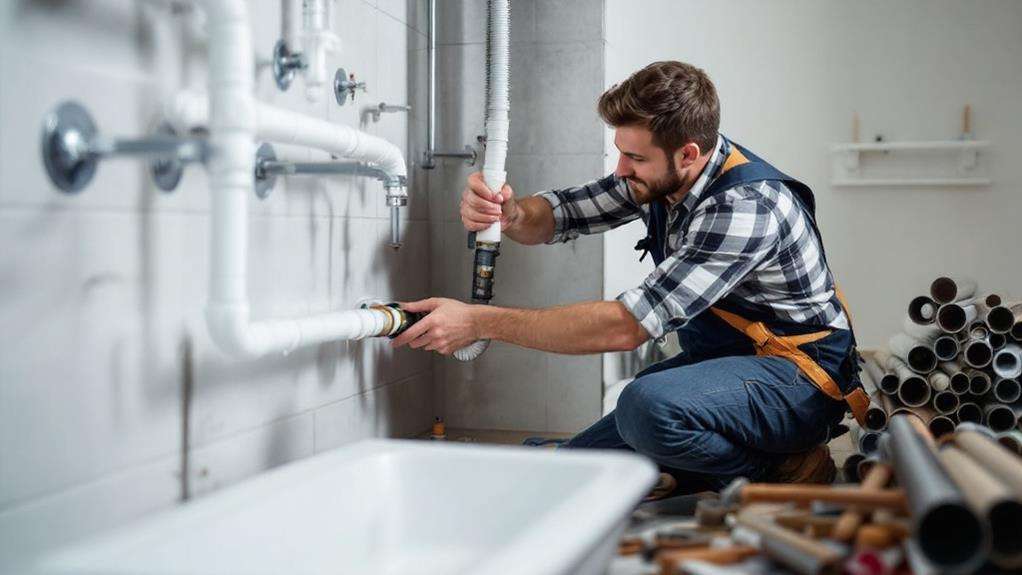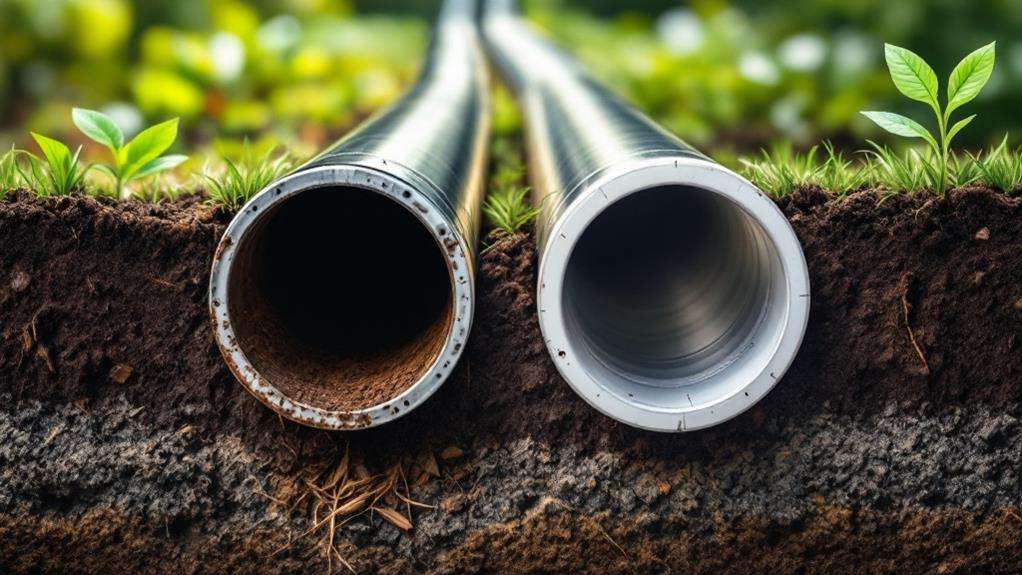Benefits of Plastic Pipes vs. Metal Pipes in Plumbing
Plastic pipes offer numerous advantages over metal pipes in plumbing. You'll find they're more cost-effective, with lower purchase and installation costs. They're also highly durable and resistant to corrosion, ensuring a longer lifespan. Installation is a breeze due to their lightweight nature and easy-to-use connections. Transportation is simpler and cheaper, reducing overall project expenses. Plastic pipes have a lower environmental impact, with reduced carbon footprints and recyclability. Their versatility allows for easy adaptations to various plumbing configurations. With benefits spanning from initial costs to long-term performance, plastic pipes present an attractive alternative to traditional metal options in modern plumbing systems. Exploring further will reveal even more advantages.
Cost-Effectiveness
When it comes to cost-effectiveness, plastic pipes come out ahead of metal pipes in most plumbing applications. You'll find that plastic pipes are considerably/markedly/notably cheaper to purchase and install than their metal counterparts. The lightweight nature of plastic pipes means you'll spend less on transportation and labor costs during installation.
While metal pipes may have a slight edge in aesthetic appeal, plastic pipes offer superior long-term maintenance benefits. You won't have to worry about corrosion or rust with plastic pipes, which can lead to costly repairs and replacements in metal piping systems. This durability translates to lower maintenance costs over time.
Plastic pipes also provide better insulation, reducing heat loss and potentially lowering your energy bills. You'll find that plastic pipes are more flexible, making them less prone to damage from freezing or ground movement. This flexibility can save you money on repairs and replacements in the long run.
Additionally, plastic pipes are easier to work with, which means plumbers can complete installations and repairs more quickly, saving you on labor costs. Overall, the cost-effectiveness of plastic pipes makes them an attractive choice for most plumbing projects.
Durability and Corrosion Resistance
Beyond cost considerations, the durability and corrosion resistance of plumbing materials play a pivotal role in their long-term performance. When comparing plastic pipes to metal pipes, you'll find that plastic options often come out on top in these aspects.
Plastic pipes, such as PVC and PEX, are inherently resistant to corrosion. They don't rust or deteriorate when exposed to water or soil, unlike metal pipes that can develop leaks or weak spots over time. This resistance to corrosion translates to a longer lifespan and fewer replacements.
Moreover, plastic pipes handle thermal expansion better than their metal counterparts. As temperatures fluctuate, plastic pipes can expand and contract without compromising their structural integrity. This flexibility reduces the risk of cracks or leaks caused by temperature changes.
Another advantage of plastic pipes is their superior insulation properties. They retain heat better than metal pipes, reducing energy loss and improving overall efficiency in hot water systems. This insulation also helps prevent condensation and freezing in cold climates.
While metal pipes can be durable, they're susceptible to mineral buildup and scale formation, which can restrict water flow over time. Plastic pipes, however, maintain their smooth interior surface, ensuring consistent water pressure and flow throughout their lifespan.
Ease of Installation

Considering the installation process, plastic pipes offer significant advantages over metal pipes. You'll find that plastic pipes are remarkably lighter, making them easier to maneuver and transport on job sites. This lightweight nature contributes to faster installation times and reduced labor costs.
Plastic pipes also feature simple connections that don't require specialized tools or complex joining techniques. You can often connect them using push-fit fittings or solvent welding, which are quicker and less labor-intensive than the soldering or threading required for metal pipes.
When installing plastic pipes, you'll appreciate these key benefits:
- Flexibility: Plastic pipes can bend and flex, allowing for easier routing around obstacles in tight spaces.
- Cutting ease: You can quickly cut plastic pipes to size using basic hand tools, saving time on adjustments.
- Fewer fittings: The flexibility of plastic pipes often means you'll need fewer fittings, reducing potential leak points.
Furthermore, plastic pipes' corrosion resistance eliminates the need for additional protective measures during installation. This simplifies the process and further reduces labor costs. Overall, the ease of installation associated with plastic pipes translates to time and cost savings for both professionals and DIY enthusiasts.
Weight and Transportation
From a weight and transportation standpoint, plastic pipes considerably outperform their metal counterparts. You'll find that plastic pipes are much lighter, making them easier to handle and transport to job sites. This weight difference translates to reduced labor costs and fewer workplace injuries during installation.
When you're working with plastic pipes, you'll be able to carry more at once, increasing efficiency on the job. The featherweight also means lower fuel consumption and transportation costs when moving materials from suppliers to construction sites. Additionally, plastic pipes' diminished weight puts less strain on building structures, which can be particularly beneficial in multi-story buildings or areas with weight restrictions.
Beyond weight advantages, plastic pipes offer superior thermal conductivity properties. You'll notice they're less prone to condensation and heat loss, which can improve overall energy efficiency in your plumbing systems. Another benefit you'll appreciate is their noise reduction capabilities. Plastic pipes are better at dampening sound, resulting in quieter water flow compared to metal pipes. This feature is especially useful in residential and commercial settings where noise reduction is a priority.
Environmental Impact

The environmental impact of plastic pipes stacks up favorably against metal pipes in several ways. When you're considering sustainability in plumbing, you'll find that plastic pipes often have a lower carbon footprint during production and transportation. They're also more energy-efficient to manufacture, requiring less fuel and generating fewer emissions compared to metal pipes.
Plastic pipes can contribute to sustainability through:
- Longevity: They resist corrosion and scaling, potentially lasting longer than metal pipes.
- Recycled content: Many plastic pipes incorporate recycled materials, reducing waste.
- End-of-life recycling: When replaced, plastic pipes can often be recycled into new products.
You'll appreciate that plastic pipes don't leach harmful chemicals into the soil when buried, unlike some metal pipes that can corrode and release contaminants. They're also less likely to react with water or chemicals flowing through them, maintaining water quality. While metal pipes have their advantages, plastic pipes often come out on top when you're looking at overall environmental impact, from production to disposal. By choosing plastic pipes, you're often making a more eco-friendly decision for your plumbing needs.
Versatility and Flexibility
Plastic pipes offer unparalleled versatility and flexibility in plumbing applications. You'll find that these pipes can be easily bent, cut, and joined to fit various configurations, making them ideal for complex plumbing systems. Unlike metal pipes, which often require specialized tools and techniques for installation, plastic pipes can be manipulated with simple hand tools, saving you time and effort.
The flexibility of plastic pipes also allows for better thermal insulation and temperature resistance. You can use them in a wide range of temperatures without worrying about expansion or contraction issues that often plague metal pipes. This adaptability makes plastic pipes suitable for both hot and cold water systems, as well as for use in areas with extreme temperature fluctuations.
You'll appreciate the versatility of plastic pipes when it comes to repairs and modifications. If you need to make changes to your plumbing system, you can easily cut and reconnect plastic pipes without the need for welding or soldering. This flexibility extends to their use in various settings, from residential homes to industrial applications, where you can rely on plastic pipes to meet diverse plumbing needs efficiently and effectively.
